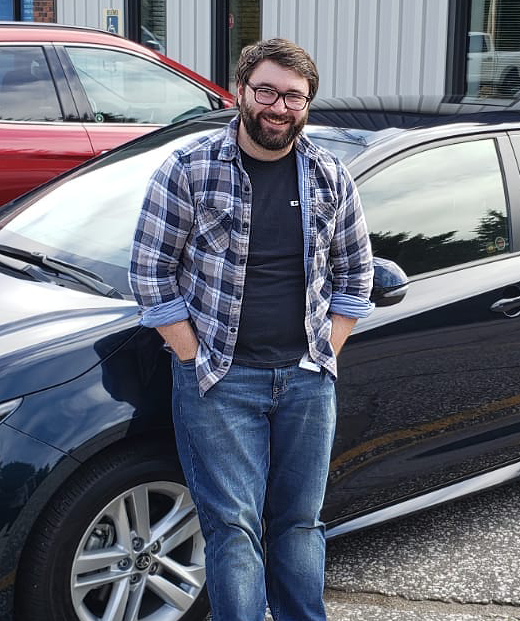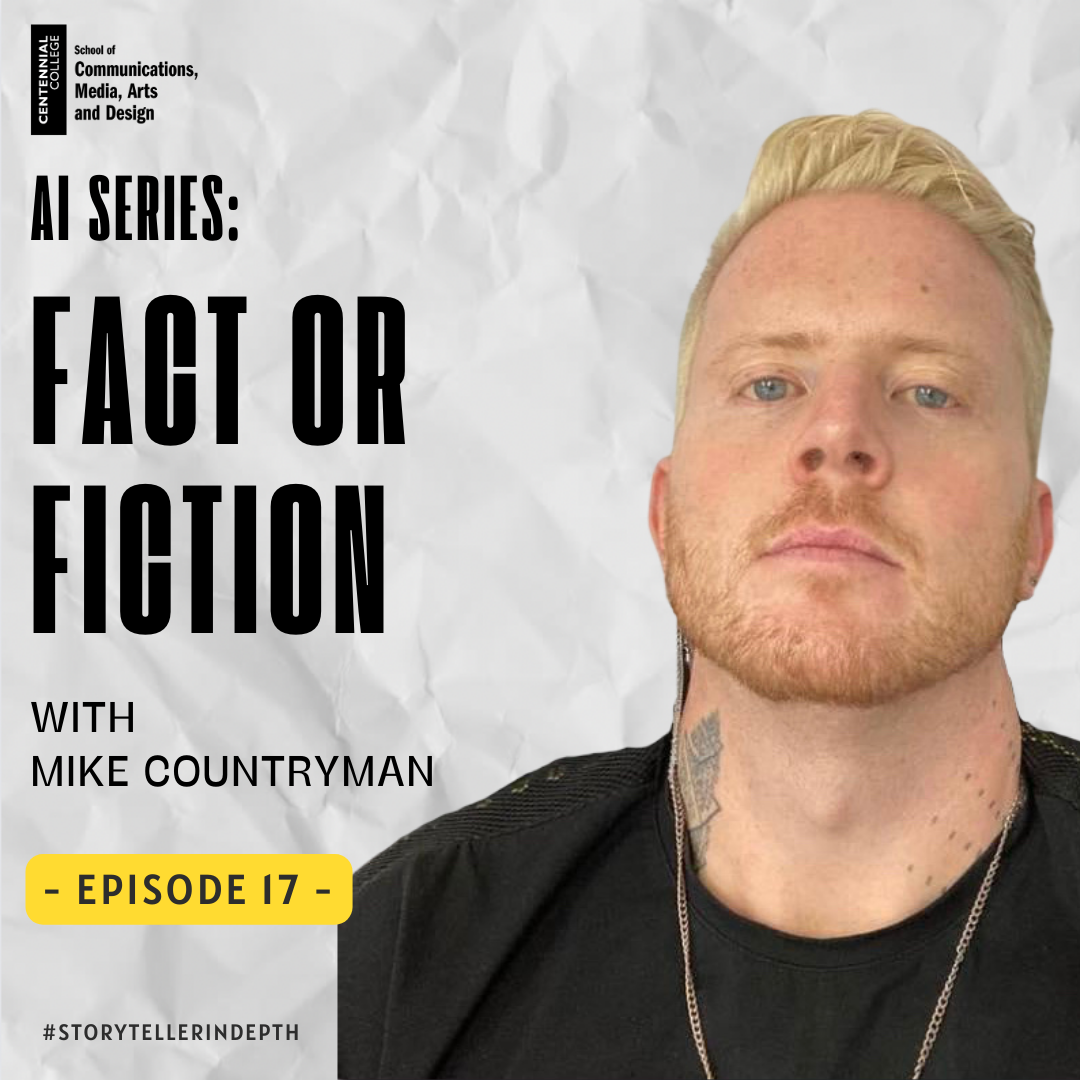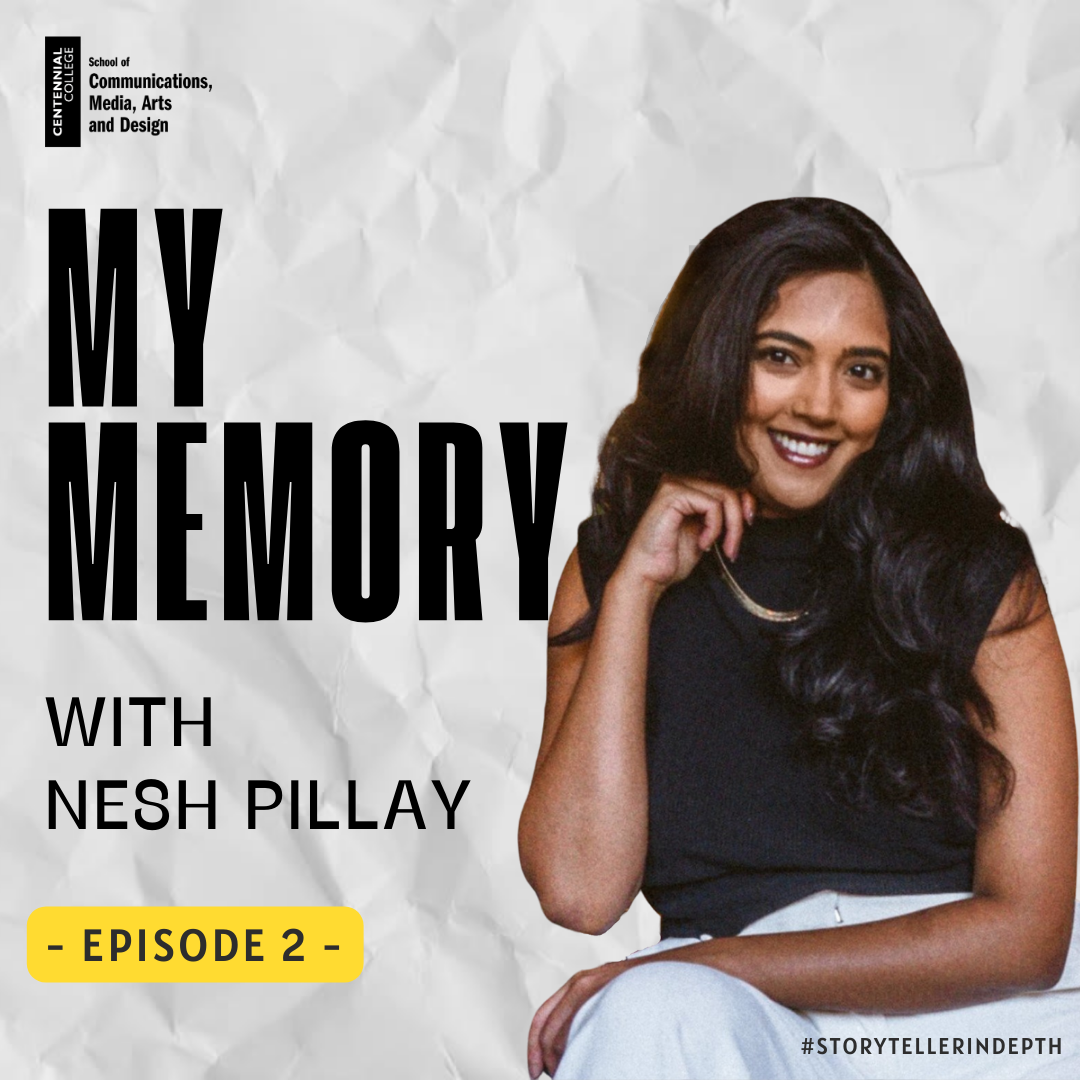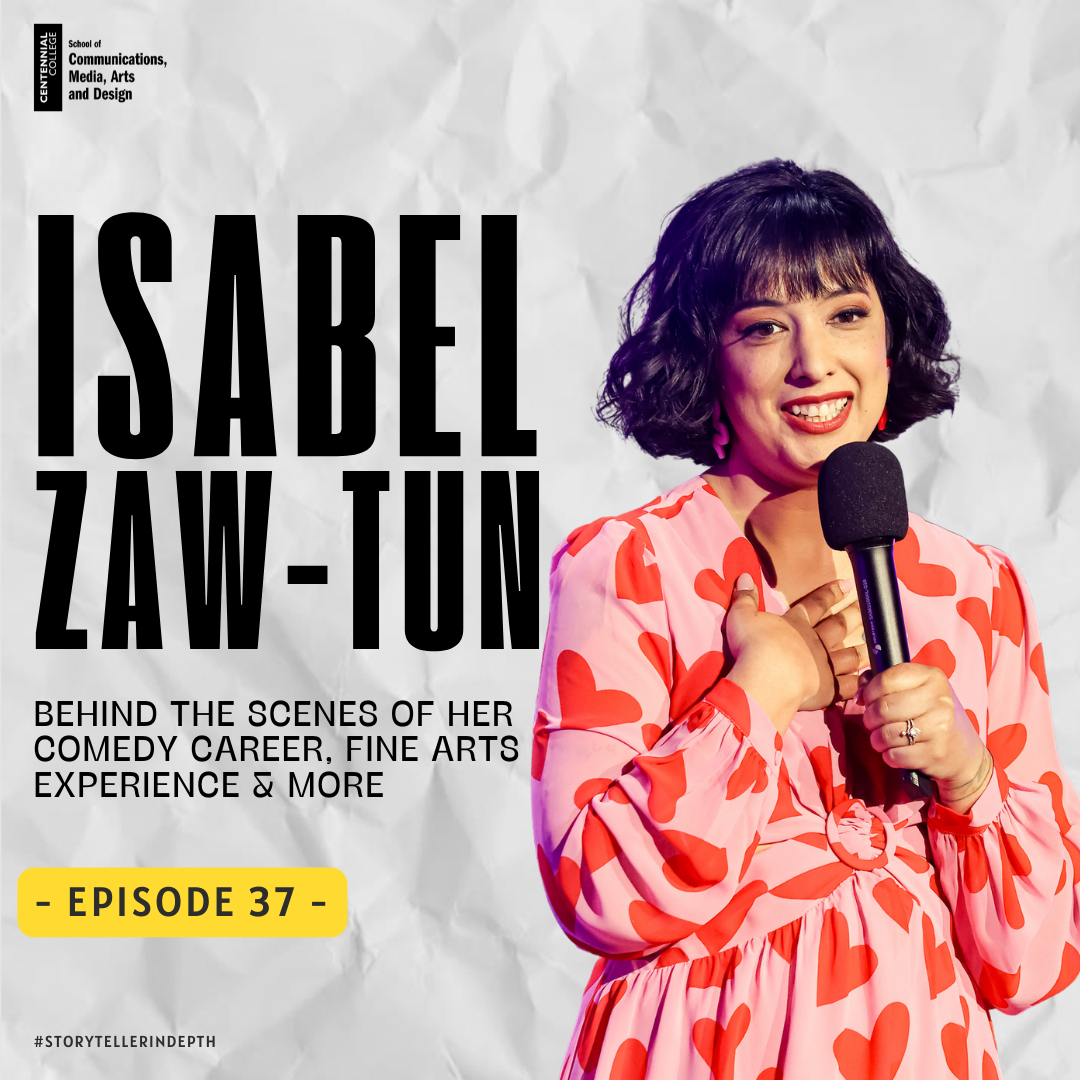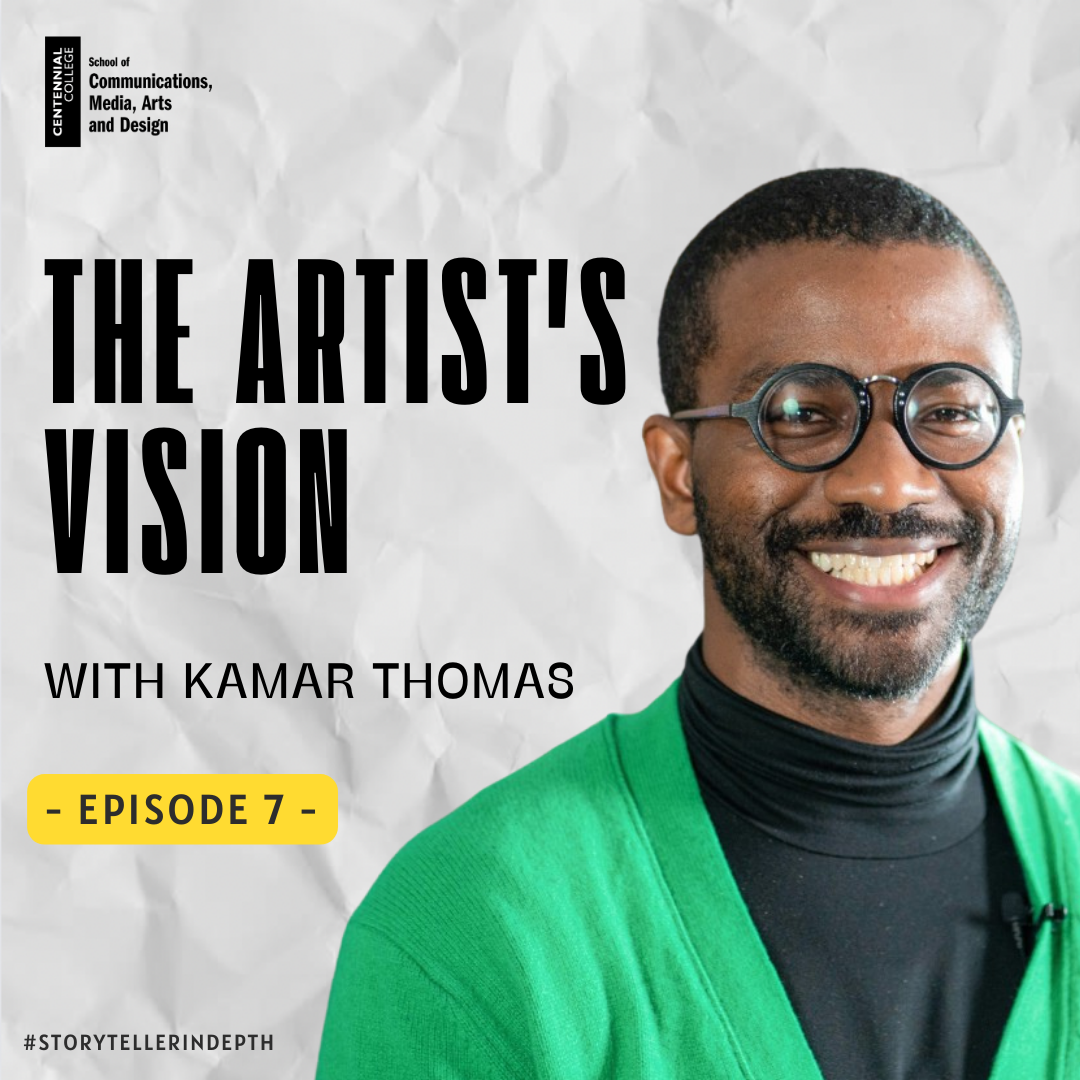Episode Transcript
[00:00:00] Speaker A: Hello and welcome to Storyteller in Depth, a podcast where we go behind the.
[00:00:04] Speaker B: Scenes to learn more about the school.
[00:00:05] Speaker A: Of communications, media Arts and designs, people, places, and things. I'm your host, Pat Cleagley. What will our society look like with all of our AI advancements and modern Software in the year 2081? A version of this question is answered in Info Freako, a new novel written by Mike Countryman, the program coordinator of our Communications and Media Fundamentals Program, which is a re envisioning of the cyberpunk genre that explores some of the updated fears and anxieties many of us have related to AI, surveillance, and more. For those that don't know, Cyberpunk is a subgenre of science fiction that centers around a dystopian future and highlights how various technological advancements are essentially taking over society and impacting its people. In this episode, Mike will help explain this a little bit more in depth and share the process of writing his novel, including how he began researching and what he discovered along the way. He will also share his views on AI in general, including his thoughts on its development and the issue of surveillance in the coming decades. Are we heading towards some of the same themes in Mike's book? Stick around.
[00:01:27] Speaker B: Thank you so much, Mike, for being.
[00:01:28] Speaker A: On the podcast today.
[00:01:30] Speaker C: Thank you very much for having me. This is great.
[00:01:32] Speaker B: Yeah, no, for sure.
[00:01:34] Speaker A: Just to begin, can you tell us a little bit about yourself, how long.
[00:01:36] Speaker B: You'Ve worked at Centennial and what program you are the coordinator of?
[00:01:40] Speaker C: Sure, that's the boring stuff. I've been teaching since 2009 at Centennial, but I was teaching in the English department, and since 2016, I've been teaching in the school, which is my dream. It's so much cooler than the other parts of Centennial, so it's much better fit for me and my vibe.
[00:01:59] Speaker B: So you've recently published a novel called Info Freako. First, can you tell listeners what it's about, some of the themes and the storyline?
[00:02:08] Speaker D: Sure.
[00:02:08] Speaker C: So I've always wanted to write a cyberpunk inspired by JapAnese anime. So I remember being like eight or nine years old, way too young. And I saw this movie Akira from 1988, and it's so violent, but also so complex and so intelligent at the same time. That really blew my mind when I was a child.
Then ghosts in the shell. But just a love of all of that and a love of Japanese culture.
It led me to write this.
So when I thought of a cyberpunk, I thought, well, how has cyberpunk changed maybe in the last 2030 years? How are our fears and anxieties different than in the. So this is a cyberpunk, but it's kind of a re envisioning of the genre, hopefully reinjecting it with some fears and anxieties that we're all kind of sensing today. State authoritarianism, artificial sentience, artificial intelligence and surveillance, very much surveillance. Capitalism. That's a big theme that runs throughout the book. Too cool.
[00:03:22] Speaker B: It's kind of interesting to think that so many of those themes from like, 1984 and all of those kind of books and movies and anime, that through line still comes through to today, right?
[00:03:37] Speaker C: Oh, yeah, absolutely.
[00:03:41] Speaker B: So can you take us through the process of writing your novel, starting with what inspired you to write it?
[00:03:47] Speaker C: So I always tell people this. For me anyway, there's no magic in writing. So anything that you can imagine just a person sitting down with a blank sheet of paper in front of them and just kind of like scratching their head for hours and then writing a sentence and then deleting it, that's basically writing. And then just do it for long enough and you're going to write a novel. So you do it for two to three years and things will come together.
For me anyway, I want it to be a work of art so that focus is more on storytelling. And so sometimes characters will come up. You don't really understand why. You're just kind of like following a flow in your mind.
There's definitely like a message in it, but that's definitely secondary. So the stuff about AI and surveillance culture and things like that. So really the motivation for writing it is just writing a work of art, being inspired by these kinds of epic, world building science fiction films that I grew up with and just saying, like, I want to do that. I want to see if I can build like a whole world, multi characters and just do that just as an existential thing primarily.
[00:05:08] Speaker D: Right.
[00:05:09] Speaker B: What was your experience possibly researching some of the themes before you started?
[00:05:15] Speaker C: That's a great question. These are all things that I very much am really interested in normally, but there was one book called the Age of Surveillance Capitalism by, I think it's Shoshana Zuboff.
She published it about five, six years ago. And that's very much an encapsulation of the polemic that you would have against companies like Google and Meta that are very much amassing our data, predicting our behavior, giving us target advertising. So that book is really like the perfect encapsulation of that. But again, my book is a fiction, so it's kind of like an exploration of that. What would happen 50 years in the future, if these companies kept amassing our data and could almost predict our behavior, predict our movements, what would that be like?
And that was very much the focus.
[00:06:11] Speaker D: Wow.
[00:06:13] Speaker B: To me, it kind of speaks like it'd be a bit of a scary world that we might be living in in the next 50 years for sure.
[00:06:19] Speaker C: Do you know what's funny? So it's very much a dystopian as most Sci-Fi it's kind of funny. Can you think of a book where it's science fiction but everything is good in the future? Yeah, I can't think of one. But it's funny because I love chat. GPT I love generative AI. That stuff is exciting, and I love playing with it. So I don't know about you, but are you interested in that kind of stuff? As soon as it came out.
[00:06:51] Speaker D: It.
[00:06:51] Speaker B: Piqued my interest for sure, but I wasn't sure what to do with it, and I wasn't sure how to use it. Right. I'd used some things in the Adobe Creative cloud software and stuff like that through AI building, which to go off of that. The COVID art for your novel was generated using AI. Right.
Why did you make that choice?
[00:07:16] Speaker C: So that's actually almost like, was a happy accident. So my friend was sending me cover images, just ideas, and he found one from a guy named Denny, and he had an Instagram page, and all his art just looked incredible and looked like, oh, that's exactly the COVID of my book. And then it said in his profile, it's generative AI. I thought, oh, that's even better.
Yeah. And he was really gracious enough for me to use it. But I don't know if you've used Generative AI, but in the same way that I'm a musician, in the same way that a drummer is going to program a drum machine, the most creative, most amazing way, it's going to be an artist that's going to be using generative AI to create incredible art because you have to feed prompts.
So that doesn't worry me, that kind of stuff.
But anyway, yeah, I wrote dystopian novel.
[00:08:23] Speaker B: Yeah.
So what's your opinions on the capabilities that AI has in today's society, then?
[00:08:30] Speaker C: I think we're still in the infancy stage.
Artificial intelligence can be very broadly defined. And so I think we used different technologies to respond to the same kinds of fears and anxieties that we've had for, I think, a few hundred years.
I think we live in an industrial world. We don't live in a state of nature. I think for most of the human condition and what we would call humanity, we lived in nature. And so I think it's just challenging for all of us to live in the world of steel and concrete and categories and things like that. So science fiction is there to respond to those kinds of fears, those kinds of anxieties. And the big one for me, and the big one in the novel, as I said before, is just this feeling of unfreedom, this feeling of being tracked and surveilled. And what would that be like if that kind of went out of hand?
[00:09:33] Speaker B: Yeah. And I'm like, I'm sorry. Just like a secondary thought that I had. It's weird to think that our vision of the future has changed so drastically in the years, right? Like, you look at as an example, like the Jetsons, which was the ideal future that we would be living in at that time. And now you look at what people are writing, like yourself, about what's going to happen in the next 50 years is completely different.
[00:10:00] Speaker C: I totally agree with you.
A friend of mine, a really good friend I grew up with, he's now a professor of science studies in Princeton, University of Chicago. It's mind blowing.
But he has this fascination, too, of what the future was supposed to be in the 1960s. And don't know how old you are, you're probably a lot younger. But I was born in 1981, and even as a child, there was still that kind of, like, halo around space exploration and what was going to do for us. And it is amazing how all that has completely gone away. And it would probably be mind blowing to someone back then to say someone in 2023 is not writing about space exploration or bionics, but they're writing about how communications and media corporations track our data. That's what's scaring us.
[00:10:57] Speaker B: Well, it went from this ideal of space exploration and broadening our view right to the known universe into what is happening next door. How can I get food from McDonald's quicker to my right? Like, and how can social media help influence why that's happening?
[00:11:19] Speaker C: It's a great point.
Everything is coming inwards. We're becoming very narcissistic, solipsistic. That's definitely for anxiety, for sure.
[00:11:30] Speaker B: Yeah, big time.
[00:11:33] Speaker A: Upon writing your book, how would you.
[00:11:36] Speaker B: Say that your views have grown or changed at all in terms of AI or surveillance capitalism in today's society?
[00:11:45] Speaker C: I've written different novels before this, so I wrote a historical novel that's completely different from this. And my first novel was science fiction, but in a very different kind of subgenre. But I realize now that I'm always writing about dehumanization.
I'm just writing about systems, whether it's gender or class, sexuality or systems of technology, systems of government, state, authoritarianism, how it kind of oppresses us, makes us less human. So this is very much just an exploration of that. Also, I'm just as bad as everybody else. Like, I'm on social media.
I'm clicking on those Targeted ads. I'm a professor. I teach this, right? So I'm very much, like, involved in this kind of stuff as well, right? And so maybe it's a bit of an atonement or something.
I tell my students to get on social media and promote themselves, and then I atone myself by writing this novel.
But I think it's fascinating and it's exciting.
I think my attitude towards new technology is that it really is something to kind of be played with and to look at its limitations, but also its dangers.
I'm not the type to say, oh, let's ban this. For instance, I think we should use Chachi PNG in the classroom, but that's a whole other story, and you should cut.
[00:13:11] Speaker A: Let's talk a little.
[00:13:13] Speaker B: Professors are going to kill for sure.
[00:13:17] Speaker A: No, we're going to keep that in.
[00:13:18] Speaker B: Because I want to dive into that a little bit.
How do you bring up the topic of conversation of AI with your students in the classroom?
[00:13:30] Speaker C: The new thing that everyone's scared of is chat GBT, which is a language model. It's not trying to give you facts, it's just trying to give you the answer that you're looking for. So it's limited. If you play around with it, you'll see its limitations, but also you'll easily see when a student uses chat GPT.
It's so obvious. And I think, oh, my God, this whole fear that it's going to write every student's essay. Like, oh, my God, anybody can look and say, oh, this student used JGBT. But it's exciting because it's a way in which you can facilitate creativity. That's how I just see any technology, at least for me. It's like, how can I use it creatively? And I think there are creative uses to it in the realm of making fiction.
And it's a little scary because we're not used to it in the world of writing. But I think fine art has been playing around with found objects for 100 years and more, and music has been doing it with sampling technology. Right? So modern music is very much AI assisted art forms. So writing is going through this right now because we're seeing this primitive form of a language model.
So I'm excited to use it, but it gets things wrong all the time and it's sexist and it's racist and.
[00:14:58] Speaker D: It'S.
[00:15:01] Speaker C: Bad for the environment too.
It's bad to use it, right?
[00:15:06] Speaker D: Yeah.
[00:15:06] Speaker B: Oh, for sure.
It's a learning model. Right. And that's what it's doing. It's learning over time. So it doesn't know its boundaries. It doesn't know it's right or wrong. And it needs that human element to rein it back in to what it needs to be.
[00:15:25] Speaker C: Just like generative AI. Also, you should talk to Kelly McConvey because she's done research into this and she played around with it in terms of asking for research. And you can get it to come up with lies so you can actually have it lie to you, make up fake research.
So that kind of stuff I love. That's exciting.
[00:15:47] Speaker B: We did talk to Kelly actually in the last episode. Hopefully they're organized this way. And we just talked to Kelly about all of that kind of stuff. And it was such an insightful conversation to learn exactly what you said, that AI will lie to you if you ask it to give you that information, right. It will create sources out of thin air and be like, no, this is real. But it's not.
[00:16:17] Speaker C: But in the same way that search engines are AI, can that be defined as AI? I think so. Students use that. We are susceptible to selection bias through their algorithms. We are susceptible to propaganda in the same way that as a teacher, we're all trying to learn how to use this effectively. We're not trying to ban the use of it. It's the same way, I think, with chat, GPT, also generative AI. That's going to be really exciting because I used to teach 2 hours on having to crop and paste an image. Now it takes a second. It's great. Now I can challenge my students even further.
That stuff's exciting.
[00:17:02] Speaker D: Yeah. Oh, for sure.
[00:17:03] Speaker B: We're going to switch gears back to your novel and talk about the storyline, which is based in the year 2081. So what is the perspective on the evolution of AI and data surveillance over the next 50 years and beyond?
[00:17:19] Speaker C: Okay, so I set it up so that there's this almost like a cold war between the east and the West. So you have an emerging empire in China. And so Tokyo is like the West Berlin. If you think of West Berlin, the 80s, it was completely just this island, right? Protected so that's our setting. It's like this massive city of 400 million under this huge kind of sky cover.
So very, kind of intense, very claustrophobic.
And what's happened is because everything is kind of finite, everything is kind of bounded. These corporations which amass data on people have just completely gone amok, run amok. And they have so much data on people that they're really, really sophisticated at predicting your behavior, and they're very sophisticated at conditioning you, at changing your built environment, changing how you move through space and time in a way to make you susceptible to coercion through your behavior. So that's kind of the backdrop. The way I envisioned the story is like, this is funny because I'm a modern writer in 2023. I think of it like as a Netflix series. So it's like multi episodes, multi storylines. So you've got a storyline of this wife, of this huge CEO. You got that kind of storyline of being way on top. Then you got the storyline of rent and these other people who are part of a terrorist organization who know what's going on, you've got a mercenary type soldier guy. So it's like that. Kind of like, I'm not reinventing the wheel, right? It's kind of like the playground of dare. Call it cliches, I don't know, maybe tropes, devices of the genre, but I just love doing that. So you've got all these multiple storylines happening. I can go further.
[00:19:31] Speaker B: And people should get it to find out more, right?
[00:19:34] Speaker C: Totally. I really, really wrote it as a commercial book. I promise you this is not a literary novel.
[00:19:41] Speaker D: Okay.
[00:19:42] Speaker C: It's not me expressing my feelings. I'm really trying to write it. Like short chapters, super Punchy, super violent, super edgy, super quick. That's the hope.
[00:19:55] Speaker D: Cool.
[00:19:56] Speaker B: So do you envision a positive evolution or do you believe that there will be a blend of favorable and unfavorable uses to AI and data surveillance?
[00:20:08] Speaker C: I think there's going to be a blend.
What do you think?
[00:20:13] Speaker B: Oh, man.
Sometimes I don't know how the rest of my week is going to go. I don't think too far into this stuff all the time, I hope a blend, for sure.
[00:20:24] Speaker C: I play around with it, but I think as long as we're very aware and we're very kind of like, hypercritical, the time of how we're doing it and why we're doing it and how often we're doing it, I think that keeps us on edge. I think that's healthy because I am not a lutta in any way so very much. It's kind of like a reflection on what I'm doing.
So, for instance, do you like targeted ads?
Do you enjoy them? It's kind of nice. In a weird way. Some days you're getting ads that you want.
[00:21:01] Speaker B: Some days it's nice because it helps me decide what's for dinner. Some days I'm like, oh, that's on sale. Okay, I'll go pick that up. But other days you're like, I don't know why I need to see that ad for a vacation again, because I'm not going anywhere. I don't have the money for that.
[00:21:17] Speaker C: Yeah, that is true.
Yeah, it can be creepy sometimes, but.
[00:21:22] Speaker B: Yeah, I don't know, when you think about the generative AI and chat GBT and all of these things, like definitely wanting that blend of still having that human connection to it. Right. And having it not become its own complete entity. So we still have that little bit of control to shape it and to mold it into what we want it to be so it doesn't take over.
Right.
[00:21:52] Speaker C: Can I ask, how old were you in like 1990?
[00:21:55] Speaker B: 619? 96. I was two years old.
[00:21:59] Speaker A: Yeah, I know. I'm younger.
[00:22:01] Speaker B: I know.
[00:22:02] Speaker C: Yeah. It's interesting, just what you said. It's interesting how we all kind of perceive the technology differently, pretending on the context, depending on the epoch. But in the 90s, it was all like this libertarian, amazing view of technology, and especially the Internet. It was going to be totally democratic, decentralized. There's going to be no oligarch of corporations owning everything like it is today.
And you just missed out because everything you said about that, that vision of technology, it was that in the 90s, but, yeah, let's bring it back.
[00:22:38] Speaker D: Why not?
[00:22:39] Speaker B: It worked theN. It should work tomorrow.
[00:22:42] Speaker C: Yeah. Everyone just get off Instagram.
[00:22:45] Speaker D: No kidding.
[00:22:47] Speaker B: So talking about your novels, do you.
[00:22:49] Speaker A: Have any other ones coming up or.
[00:22:51] Speaker B: Themes you'd like to explore more in your writing?
[00:22:55] Speaker C: Yeah. So maybe because I'm a young novelist, I've only written three books. I have colleagues who've written multiple and then Random House publishes like their 7th or something. So I have to perceive myself as being still kind of young.
I'm always changing a genre. So this next book is not going to be science fiction. It's going to be like a personal kind of memoir.
So that's always going to happen. But I think all writers, they just have the compulsion to write. So they're always going to be writing. So, yeah, for. Yeah, there's going to be a next.
[00:23:31] Speaker B: Book well, I can't wait to hear about it and hopefully read it as well.
[00:23:35] Speaker C: Thank you.
[00:23:35] Speaker B: For sure.
[00:23:37] Speaker C: Thank you very much.
[00:23:38] Speaker B: So, Mike, we're coming up to near the end of the conversation, and something we like to ask this panel of people that we've kind of got lined up to talk about AI and discussing AI is that if you had access to any AI tool, it can be completely imaginary or something you think could actually be developed one day. What would you love for it to do?
[00:24:05] Speaker C: So this is a cop out because it's not a real thing, but this is what I want it to do. I want it to facilitate genuine human connection face to face.
[00:24:15] Speaker D: Oh, wow.
[00:24:16] Speaker C: I just want some kind of technology that is there to help people literally just connect and experience things in nature. I know that sounds so corny, but what we need is human connection. We need to go and play volleyball with strangers.
We need to go play Pokemon, go with a bunch of people you just met that day. There's stuff like that that we've been missing.
And you think about those Rogers commercials, about how the whole family's hanging out together, but everybody's staring at a screen.
You can tell how awkward it is for that advertising company to try and show us that being on technology brings us together as humans, but it's not. It's so dissonant. So that's what I would hope. That's what I would develop.
[00:25:07] Speaker D: That's awesome.
[00:25:07] Speaker B: Anyway, very cool. And I don't think it's a cop out at all. I'd love something like that that would help bring us back and be like, hey, here's a cool trail.
Know that we've helped blaze for you and all this kind of stuff. That's really cool.
[00:25:24] Speaker C: Yeah.
[00:25:24] Speaker D: Awesome.
[00:25:25] Speaker B: Well, Mike, thank you so much for.
[00:25:27] Speaker A: Being on the podcast today.
[00:25:29] Speaker C: Thank you very much for interviewing. Great. You know, yeah.
[00:25:32] Speaker B: And maybe we'll catch up next time when your next book comes out and we'll talk more about that then.
[00:25:37] Speaker C: Great. I would love that. Thank you.
[00:25:44] Speaker A: Thank you, Mike, for being on the podcast and sharing details about your new book. It was so interesting to hear about your writing process and your thoughts on this topic as a whole. Info Freako is available on Amazon, so be sure to check it out. We have more episodes on the way, so if you enjoyed this one, be sure to give our podcast a follow so you'll be alerted for our next episode. You can also always check out our Instagram at Story Art center for more episode posts. Until next time, I'm your host, Pat Quigley, and this is storyteller in depth.
